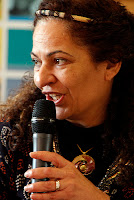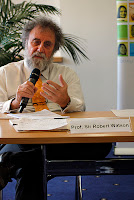 |
| Lidia Brito. Photo: Lance Bellers |
Guest blog by Ruth Segal, Doctoral Researcher, SPRU
In recent years, global initiatives have attempted to co-ordinate scientific advice and assessments – on climate change, biodiversity and agriculture, among other topics. The second day of the STEPS Symposium on the global politics of scientific advice opened with a panel looking at these global structures.
Prof Ian Scoones, co-director of the STEPS Centre, introduced the session by asking how assessments should be organised; who is included, who decides and what are the underlying politics?
The two panellists, Prof Lidia Brito, director of UNESCO’s science policy division, and Prof Sir Robert Watson, former Chief Scientific Advisor for DEFRA, drew from their extensive experience to address the question of what makes for effective and successful international engagement between scientific advice and policy making.
The two presentations were very different in style, and presented different approaches to building effective structures for scientific advice. Prof Brito focused on the importance of ensuring that science and policy address societal needs, which, she said must be at the heart of any process. She stressed that processes should connect the three worlds of policy formation, scientific enquiry and societal need. In order to do this, openness and engagement were vital to “multiply faces and amplify voices”. Scientific evidence should be embedded in all stages of a process, rather than just included at the end in advice to policy makers, she said.
Prof Brito also stressed that policy processes should include capacity building, as scientific capacity is not equally distributed. Countries are not equally able to participate in policy processes, reinforcing hidden power relations. Power dynamics also come into play when examining what issues are covered in the processes, whose questions are addressed, and what forms of knowledge are included as evidence.
 |
| Bob Watson. Photo: Lance Bellers |
Prof Watson’s address combined a barrage of both science and Powerpoint slides. And, as would be expected from an audience made up of the great and good of the science policy and STS worlds, the questions and responses were incisive and illuminating.
Prof Watson outlined the experiences and lessons learned from several processes, including IAASTD and IPCC; and discussed two processes still under development: IPBES (Intergovernmental Platform on Biodiversity and Ecosystem Services) and the Future Earth project.
He described the key factors for a successful process, highlighting the need for processes to be open and involve a balanced range of stakeholders who are able to work together to co-design and co-produce the outputs. Ownership and participation were vital, he said, as are evidence-based outputs, which can be peer-reviewed. Global assessment processes must be multi-disciplinary and focus on the needs of society, he said, stressing the importance of stakeholder engagement, co-production and trans-disciplinary working.
Questions from the floor focused on knowledge – whose, what sorts, and where international assessments look for knowledge; how power relations are taken into account when using knowledge from different communities; how ‘expertise’ is defined; capacity building; and the politics of knowledge production. A concern was raised that the questions of interest to communities at the grassroots may not be those being asked by international panels; how can these be incorporated but not subsumed into a single consensus?
There was a concern from one delegate that the talk of openness and participation can at times be nothing more than rhetoric. A nother raised the legitimacy of the ‘indigenous’ representatives participating in the processes: how are they selected and who does the selecting?
The session raised many questions about the value and purpose of global assessments, but did not, in my view, wholly manage to grapple with questions of power and politics in global deliberations. The perspectives of marginal communities in developing countries remained marginal to the discussion of assessing global linkages across multiple sectors.
Many of these questions are about how to include, and reflect, more views in global scientific processes. How can rhetoric about inclusiveness be turned into a real attempt to look at questions about what sort of expertise is included? Who are the participants in global processes? Are they just part of the international development juggernaut – the same people talking to each other in multiple fora? There was a call for policy solutions to address the needs of stakeholders, but who defines who the stakeholders are? The presentations demonstrated a huge ambition to link global issues, but how do they make an impact on people’s daily lives?
If the theme of the session was how to design open and accountable decision-making processes and how they might use science effectively, the discussion raised many questions about whether these huge global assessment processes are open or accountable, who is involved in making the decisions, how the issues to be examined are chosen, how the questions are framed, what is considered to be scientific evidence, and much more.
The session raised more questions than it answered, but as Prof Brito had suggested that scientists should be interested in conflict stimulation – continually questioning evidence and understandings – perhaps that was appropriate.
To view resources, video, commentary and slides from the event, visit the Symposium page on the STEPS Centre website.